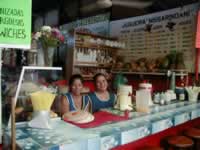
Volume X - Mexico, Part I
 I’m not sure what historical or geographical phenomenon
prevented the influence of Mexican cuisine from reaching farther
south, BUT…it sure was a joy to our stomachs to cross the border!
Mexico, of course, is a huge country, with many states and varied
regional cooking, but so far all of it – with the exception
a few restaurants catering to gringo touristas – has been great. I’m not sure what historical or geographical phenomenon
prevented the influence of Mexican cuisine from reaching farther
south, BUT…it sure was a joy to our stomachs to cross the border!
Mexico, of course, is a huge country, with many states and varied
regional cooking, but so far all of it – with the exception
a few restaurants catering to gringo touristas – has been great.
And what great beer! Not
just one brand, but a whole rainbow. Is there is any place else
in the world where there is such a wide selection
of interesting and delicious beer? I mean, if you are going to drink
beer at all, what a pleasure it is to really enjoy it. Our favorites
are Pacifico, Indio, Negro Modelo & Victoria. But then there’s
Tecate and Modelo and Sol and Coronoa and Dos XX – Claro or
Oscura………One has to have a few favorites, as most
places buy only from one of the two or three distributors, each of
which distributes only distributes one line. This becomes a bit of
an issue if you buy beer in bottles, which of course is best tasting,
as you must return your bottles to the right distributor to get the
next case!
Our best meals by far along the Pacific coast of Mexico have been
in the cheaper eateries, like the tiny stall with the two smiling
ladies in the La Crucecita central market where we had our first
tacos dorado. Once we got over their not being fish tacos, but rather
rolled-up chicken-filled tortillas fried crispy, we were hooked.
The market itself was
a delight, with the vendors perched high behind sloping displays
of lovely fruits and vegetables. In the same market
I bought my first mole sauce (Oaxacan) in a knotted plastic baggie.
Dark as chocolate and thick as fudge, I wasn’t exactly sure
how to prepare it, but, diluted with chicken broth and served over
chicken, it was the most scrumptious new flavor to hit TII in years.
The chicken to put under the mole was also available in the market.
The skin of these chicken was such a bright yellow it was alarming,
until we learned that the chickens are fed marigold petals to get
them that way! Next to the mole stall was a lady selling Oaxacan
cheese, a salty string cheese the vendors unravel from a huge ball.
And across the street from both was a tortilleria where stacks of
fresh hot tortillas could be bought by the kilo. Plus, we got some
excellent coffee beans from a kiosk right in the plaza in Huatulco.
Acapulco, our second major
stop up the coast, is the grande dam of Mexican resort cities.
La Costera, the beach strip, is permeated
by such American clones as hard Rock Café, Planet Hollywood
and Hooters, for those who want to travel without going anywhere
new. Of course any of the above was the perfect place to spend super
Bowl Sunday, as we did. Food wise, however, we did better in the
old town neighborhood having our first goat tacos at a tacqueria
behind the bank and really fine tostadas de pierna (leg of pork.)
in Las Canastas, a restaurant by recommended by the customs agent
who did our import papers.
In Zihuatenejo, our next
stop, eating was surely the major activity among the hundred plus
cruisers hanging out there. The market was
again a favorite haunt where we were introduced to carnitas – tacos
of roast pork with cilantro and chopped onions – and where
we could get the best chile rellenos I have ever had. What really
was amazing is that they had the stuffed and battered poblano chiles
all ready to go, so that you could purchase as many as you wanted
along with the wonderful sauce and take them home in Styrofoam to
the boat! This “take-out” nature of Mexican markets was
a real pleasant surprise. The fact that you could buy labor-intensive
makings like mole sauce, chile rellenos, fresh tortillas and even
kilos of carnita meat to carry home to assemble made the mysteries
of Mexican cuisine much more approachable. Even in the modern supermarkets
you find tortilla bakeries and vats of mole sauce, not to mention
mountains of packaged tortillas and a whole line of boxed sauces
from Knorr!
As if all the great restaurants in Zihuatenejo aren’t enough
(and we’ve only given you a fleeting glimpse), on Sunday evenings
the town square fills up with food vendors, and the residents, tourists
and cruisers all turn out to graze among the very inexpensive offerings.
(Well, maybe not the really transient tourists….most of them
stroll through looking suspiciously down their very pales noses before
wandering off to a restaurant with a tablecloth. ) There are stalls
for tacos, empanadas (deep-fried), tamales, pancakes, plus a whole
range of sweets. Ironically, the favorite stop for cruisers seemed
to be the guy with the hamburgers. From a NYC style pushcart, this
gentleman assembles burgers topped with ham, two cheeses, avocado,
onion, salsa, mayo, mustard and ketchup! Can we say “cholesterol”!
In Zijuatenejo we also had our first (and best) pozole. Pozole is
a soup with a rich stock usually made of pork (the head is the preferable
piece to stew!), but sometimes of chicken, and always with hominy.
In Guerrero State, where Zihuatenejo is located, you can choose between “green” or “white” pozole,
and it is traditionally served on Thursdays. Elsewhere else, pozole
is usually red. Whatever the color, pozole is turned into an elaborate
meal by the addition of garnishes, which could include shredded cabbage,
sliced radishes, sliced green onions, sliced avocado, cubes of jack-type
cheese, lime wedges, hot peppers, and even little piles of oregano
and cilantro, presented so diners can add and season to their own
taste. tourists….most of them
stroll through looking suspiciously down their very pales noses before
wandering off to a restaurant with a tablecloth. ) There are stalls
for tacos, empanadas (deep-fried), tamales, pancakes, plus a whole
range of sweets. Ironically, the favorite stop for cruisers seemed
to be the guy with the hamburgers. From a NYC style pushcart, this
gentleman assembles burgers topped with ham, two cheeses, avocado,
onion, salsa, mayo, mustard and ketchup! Can we say “cholesterol”!
In Zijuatenejo we also had our first (and best) pozole. Pozole is
a soup with a rich stock usually made of pork (the head is the preferable
piece to stew!), but sometimes of chicken, and always with hominy.
In Guerrero State, where Zihuatenejo is located, you can choose between “green” or “white” pozole,
and it is traditionally served on Thursdays. Elsewhere else, pozole
is usually red. Whatever the color, pozole is turned into an elaborate
meal by the addition of garnishes, which could include shredded cabbage,
sliced radishes, sliced green onions, sliced avocado, cubes of jack-type
cheese, lime wedges, hot peppers, and even little piles of oregano
and cilantro, presented so diners can add and season to their own
taste.
Pozole Rojo (Serves 6)
750 grams hominy, rinsed and drained
1 head garlic
1 lbs pork loin
1 lb pork leg, butt end, R-T-C
1 onion, to cook with the pork
salt, to taste
50 grams chiles ancho
50 grams chiles gaujillo
(Note: if you don’t have access to dried Mexican chiles, you
could substitute chili powder!)
stock, from cooking the pork
Typical Garnishes:
1/2 head cabbage, shredded finely
dried oregano
12 radishes, sliced
1 onion, chopped fine
4-5 limes (key lime type), quartered
12 tostada shells
2-3 avocados, diced
½ lb queso fresco (fresh cheese, eg. Farmers cheese)
(Sorry about the “grams” measurements;
Joy of Cooking has conversions!)
• Rinse the hominy, and place in a pot with the garlic head, and
cook over low heat without adding salt until it is soft.
• In another large pot, cook the pork with the onion and salt. When
it is cooked, cut the meat into chunks.
• Soak the chiles in hot water. Put chiles and water into blender
and blend into a paste. Add to the pot with the hominy kernels.
• Add the meat and a little of the stock in which it was cooked,
and season with salt and leave to boil for 20 minutes over a low
heat.
• Arrange all the garnishes in pretty bowls and set out on table.
• Remove the head of garlic, and serve the soup accompanied by all
the garnishes, allowing everyone to add what they want.
|